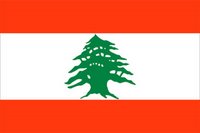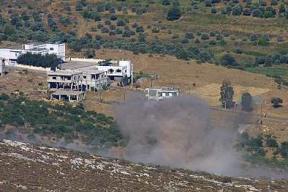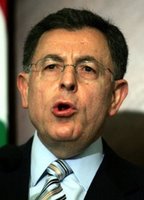
The Wizard of Beirut has just been conceived as a project to analyse and comment on developments in the Middle East and more specifically in Lebanon. For Lebanon we will begin with a cast of the characters concerned, "Dramatis personae", for the most part megalomaniac self centred politicians whose primary concern has been to serve their own interests rather than the interests of Lebanon.
At the top of the pinnacle stands or rather sits President Emile Lahoud who clings to his presidential seat with demonic ferocity, despite the rising tide of unpopularity and opposition to his very existence. Nominated to his high office of President of the Republic by the Syrians who occupied Lebanon at that time and who bulldozed a prolongation of his six year term of office by an additional three years, using threats against Prime Minister Rafik Al Hariri and a number of Lebanese deputies to insure a favourable parliamentary vote.
The next character of the cast is the Speaker of the House. Nabih Berri, who is currently serving his fourth four year term of office as Speaker. He is machiavellic and very astute, and very au courant with the foibles and seamy side of his deputies which he has exploited to perfection to perpetuate his position as Speaker of the House.
Prime Minister, Fouad Siniora, is more of a sheep among the wolves. Nonetheless, he has shown great courage and innate political sense in facing and dealing with the challenges of his critics in and out of Parliament, and of course in dealing with the ever looming menace of the Syrian regime.
Out of office, we have a buffoon called General Aoun, who acts and speaks like a buffoon and who aspires to become President of Lebanon, with the help and support of the Hezbollah, a Shiite political and military group which takes credit for the liberation of South Lebanon from Israeli occupation. At the head of this group stands Sheikh Hassan Nasrallah, a charismatic cleric who runs Hezbollah (party of God) with an iron hand. He is a brilliant speaker and tactician and he is of course a close ally of Iran and Syria, on which two countries he relies for funds and arms.
Last by not least comes the feudal lord and socialist leader Walid Jumblatt who controls the Chouf mountains, the stronghold of the Druze community in Lebanon. He has and continues to play a principal role on the Lebanese stage. A skilled politician, he has an acute nose for the direction of the wind and he plays his respective roles accordingly. Currently he is very much anti-Syrian.
There are of course other actors on the stage, such as Samir Geagea of the Forces Libanaises, Samir Franjieh and others. They are important figures but they play a secondary role.
This introduction may help the readers to understand future developments in Lebanon.








